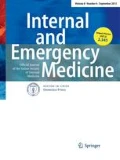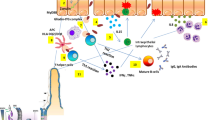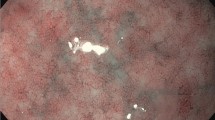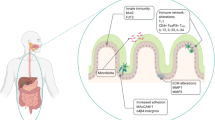Abstract
Defective spleen function increases susceptibility to bacterial infections which can be prevented by vaccine prophylaxis. Splenic hypofunction can be found in a number of autoimmune disorders; however, no data are available regarding autoimmune atrophic gastritis (AAG), autoimmune enteropathy (AIE) and autoimmune liver disease (AILD). Peripheral blood samples from patients with AAG (n = 40), AIE (n = 3) and AILD (n = 40) were collected. Patients affected by autoimmune disorders already known to be associated with splenic hypofunction, i.e. coeliac disease (CD) and ulcerative colitis (UC), were included as disease controls, while splenectomised patients and healthy subjects were evaluated as positive and negative controls, respectively. Counting of erythrocytes with membrane abnormalities, i.e. pitted red cells, was used as an indicator of spleen function (normal upper limit 4%). Defective splenic function was observed in 22 of the 40 patients with AAG (55.0%), in two of the three patients with AIE (66.6%) and in 35 of the 40 patients with AILD (87.5%). As expected, in untreated CD, refractory CD and UC there was a high prevalence of hyposplenism (43.7%, 88.2% and 54.4%, respectively). Due to the high prevalence of splenic hypofunction, patients with AAG, AILD and AIE should undergo pitted red cell evaluation and, if hyposplenic, they should be candidate to vaccine prophylaxis against encapsulated bacteria.

Similar content being viewed by others
Abbreviations
- AAG:
-
Autoimmune atrophic gastritis
- AIE:
-
Autoimmune enteropathy
- AIH:
-
Autoimmune hepatitis
- AILD:
-
Autoimmune liver disease
- CD:
-
Coeliac disease
- PBC:
-
Primary biliary cholangitis
- PSC:
-
Primary sclerosing cholangitis
- RCD:
-
Refractory coeliac disease
- UC:
-
Ulcerative colitis
References
Di Sabatino A, Carsetti R, Corazza GR (2011) Post-splenectomy and hyposplenic states. Lancet 378:86–97
Corazza GR, Zoli G, Di Sabatino A et al (1999) A reassessment of splenic hypofunction in celiac disease. Am J Gastroenterol 94:391–397
Di Sabatino A, Brunetti L, Carnevale Maffè G et al (2013) Is it worth investigating splenic function in patients with celiac disease? World J Gastroenterol 19:2313–2318
Di Sabatino A, Rosado MM, Ciccocioppo R et al (2005) Depletion of immunoglobulin M memory B cells is associated with splenic hypofunction in inflammatory bowel disease. Am J Gastroenterol 100:1788–1795
Di Sabatino A, Aronico N, Giuffrida P et al (2018) Association between defective spleen function and primary eosinophilic gastrointestinal disorders. J Allergy Clin Immunol Pract 6:1056–1058
Di Sabatino A, Rosado MM, Cazzola P et al (2006) Splenic hypofunction and the spectrum of autoimmune and malignant complications in celiac disease. Clin Gastroenterol Hepatol 4:179–186
Simons M, Scott-Sheldon LAJ, Risech-Neyman Y et al (2018) Celiac disease and increased risk of pneumococcal infection: a systematic review and meta-analysis. Am J Med 131:83–89
Emilsson L, Lebwohl B, Green PH et al (2018) Mucosal healing and the risk of serious infections in patients with celiac disease. United Eur Gastroenterol J 6:55–62
Kruetzmann S, Rosado MM, Weber H et al (2003) Human immunoglobulin M memory B cells controlling Streptococcus pneumoniae infections are generated in the spleen. J Exp Med 197:939–945
Di Sabatino A, Rosado MM, Cazzola P et al (2008) Splenic function and IgM-memory B cells in Crohn’s disease patients treated with infliximab. Inflamm Bowel Dis 14:591–596
Dixon MF, Genta RM, Yardley JH et al (1996) Classification and grading of gastritis. The updated Sydney system. International Workshop on the Histopathology of Gastritis, Houston 1994. Am J Surg Pathol 20:1161–1181
Di Sabatino A, Biagi F, Lenzi M et al (2017) Clinical usefulness of serum antibodies as biomarkers of gastrointestinal and liver diseases. Dig Liver Dis 49:947–956
European Association for the Study of the Liver (2015) EASL Clinical Practice Guidelines: autoimmune hepatitis. J Hepatol 63:971–1004
European Association for the Study of the Liver (2017) EASL Clinical Practice Guidelines: the diagnosis and management of patients with primary biliary cholangitis. J Hepatol 67:145–172
European Association for the Study of the Liver (2009) EASL Clinical Practice Guidelines: management of cholestatic liver diseases. J Hepatol 51:237–267
Di Sabatino A, Corazza GR (2009) Coeliac disease. Lancet 373:1480–1493
Rubio-Tapia A, Murray JA (2010) Classification and management of refractory coeliac disease. Gut 59:547–557
Magro F, Gionchetti P, Eliakim R et al (2017) Third European evidence-based consensus on diagnosis and management of ulcerative colitis. Part 1: definitions, diagnosis, extra-intestinal manifestations, pregnancy, cancer surveillance, surgery, and ileo-anal pouch disorders. J Crohns Colitis 11:649–670
Rachmilewitz D (1989) Coated mesalazine (5-aminosalicylic acid) versus sulphasalazine in the treatment of active ulcerative colitis: a randomised trial. BMJ 298:82–86
Markus HS, Muller AF, Toghill PJ (1993) Splenic function, assessed by quantification of erythrocyte membrane pits, is normal in chronic active hepatitis and primary biliary cirrhosis. J Hepatol 18:106–111
Trevisani F, Castelli E, Foschi FG et al (2002) Impaired tuftsin activity in cirrhosis: relationship with splenic function and clinical outcome. Gut 50:707–712
Carsetti R, Rosado MM, Wardemann H (2004) Peripheral development of B cells in mouse and man. Immunol Rev 197:179–191
Arnott A, Jones P, Franklin LJ et al (2018) A registry for patients with asplenia/hyposplenism reduces the risk of infections with encapsulated organisms. Clin Infect Dis 67:557–561
Di Sabatino A, Lenti MV, Corazza GR (2018) Spleen registry: still a chimera. Clin Infect Dis 67:562–563
Acknowledgements
The authors would like to thank all the subjects who agreed to give blood samples, without whom this study would not have been possible.
Funding
None.
Author information
Authors and Affiliations
Contributions
All authors participated in the drafting of the manuscript or critical revision of the manuscript for important intellectual content and provided approval of the final submitted version. Individual contributions are as follows. ADS: study concept and design, analysis and interpretation of data, manuscript preparation, principal investigator, and guarantor. PG, MVL: study concept and design, acquisition of data, technical and material support, manuscript preparation. NA: acquisition of data, technical and material support, manuscript preparation. SC and MD: acquisition of data, technical and material support. MR, DR, FS, DT and EM: clinical management of patients. GRC, MP, and ADS: study supervision.
Corresponding author
Ethics declarations
Conflicts of interest
None to declare.
Statement of human and animal rights
All procedures performed in studies involving human participants were in accordance with the ethical standards of the institutional and/or national research committee and with the 1964 Helsinki declaration and its later amendments or comparable ethical standards.
Informed consent
Each patient provided informed consent to the study.
Additional information
Publisher's Note
Springer Nature remains neutral with regard to jurisdictional claims in published maps and institutional affiliations.
Rights and permissions
About this article
Cite this article
Giuffrida, P., Aronico, N., Rosselli, M. et al. Defective spleen function in autoimmune gastrointestinal disorders. Intern Emerg Med 15, 225–229 (2020). https://doi.org/10.1007/s11739-019-02129-w
Received:
Accepted:
Published:
Issue Date:
DOI: https://doi.org/10.1007/s11739-019-02129-w




